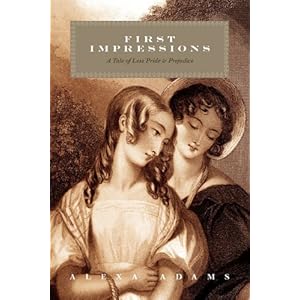While I found this bo
 ok entirely readable, let me just say right off the bat that the Kindle edition at least has major punctuation issues and even some spelling errors. At one point "Darcy" was spelled with an e between the c and the y! Are the shades of Pemberley to be so polluted? (Sorry, I couldn't resist!) I also found myself exclaiming out loud, a la Mrs. Elton, "There is a shocking lack of commas in this narrative!" It seriously drove me nuts.
ok entirely readable, let me just say right off the bat that the Kindle edition at least has major punctuation issues and even some spelling errors. At one point "Darcy" was spelled with an e between the c and the y! Are the shades of Pemberley to be so polluted? (Sorry, I couldn't resist!) I also found myself exclaiming out loud, a la Mrs. Elton, "There is a shocking lack of commas in this narrative!" It seriously drove me nuts.Anyway, issues of grammar aside, as I said, the story is very readable. It also explores a question that I'm sure a lot of P&P lovers have asked themselves: What if Mr. Darcy had manned up and danced with Elizabeth when they first met at Meryton, instead of waiting until the Netherfield ball, when her prejudice had already been solidified by the evil manipulations of Mr. Wickham? Everyone's been wondering that, right?
Well, I actually have before. There are a lot of things in P&P that leave room for what ifs. Like, what if Bingley had gone against Darcy's initial advice and proposed to Jane anyway? Or what if Elizabeth and Lydia and Kitty and I can't remember exactly who else was there had not met Mr. Wickham in town that day? What if, when Lizzy and the Gardiners were in Lambton, Jane's letter had arrived a day later?
I love the idea of changing the course of an entire story by just adding or changing one element. I thought this was done rather well in "Lost in Austen", which had a modern 20-something woman change places with Elizabeth Bennet. This threw off the entire plot, and the main character's attempts to "fix" it only made things worse. In this case, the changed element made the story more complicated, added more conflict, thus making it more interesting.
But the opposite is true for "First Impressions." Its subtitle really tells it all: "A Tale of Less Pride and Prejudice." But, you see, the pride and the prejudice are what make it "Pride and Prejudice." The Mr. Darcy in this version of the story does indeed have less pride. There is much less conflict, none at all, in fact, between Darcy and Elizabeth because they communicate perfectly with each other from the beginning. (I mean, what kind of person says exactly what they mean? What kind of game is that?) It's all very pleasant, but in fiction pleasant is boring.
I was pleased enough with the pleasantness to finish the book, because I love the characters, and for the most part, the author stays true to them. But I doubt I'll give it a second read. From now on I prefer to keep my what if speculations off the page (or Kindle screen). Except for, what if Caroline Bingley is a Terminator, a cyborg sent back in time to terminate Elizabeth Bennet, the future leader in the defense against zombie uprising...
